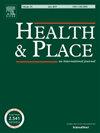孟加拉国城市妇女在卫生方面的决策作用与心理健康之间的关系
IF 4.1
2区 医学
Q1 PUBLIC, ENVIRONMENTAL & OCCUPATIONAL HEALTH
引用次数: 0
摘要
研究表明,妇女和女孩面临与影响其心理健康的卫生相关的性别压力源,妇女决策机构可能在这种关系中发挥作用。这项研究旨在定量评估孟加拉国两个城市的妇女与卫生有关的决策(总体上、在家庭内和在社区内)与福祉之间的关系。本文是对2022年3月至4月期间在孟加拉国Meherpur和Saidpur收集的1449名妇女的横断面调查数据的二次分析。我们使用世界卫生组织幸福指数[WHO-5]来衡量福祉,主要暴露包括妇女与卫生有关的决策和使用非公用厕所的情况。决策使用机构、资源和机构结构对卫生相关授权(ARISE)量表进行衡量;第一次分析采用全量表得分,第二次分析采用5个个体因子得分。在控制生活阶段、社会经济水平、感知到的社会支持和自我报告的身体健康等因素的情况下,采用线性回归模型评估决策与幸福感得分之间的关系。以城市作为固定效应进行分析,并按城市分层。这两个城市的平均幸福感得分都不高,大约20%的受访者表示幸福感较差。平均而言,女性普遍同意她们在与卫生有关的决策中发挥作用(在1-4的范围内,平均得分= 2.66,得分越高表明她们越认同自己有能力做出与卫生有关的决策)。在使用完整决策量表得分的完整模型中,结果表明总体决策量表得分与幸福感呈正相关(β = 0.73, p = 0.02)。在使用决策因素得分的完整模型中,我们观察到福祉与个人决策因素得分之间存在正相关关系,影响社区一级卫生决策的能力(β = 1.10, p = 0.0002)和做出小型家庭卫生决策的能力(β = 1.07, p = 0.006)。相反,参与社区卫生决策的能力与幸福感呈负相关(β = - 0.68, p = 0.02)。参与家庭卫生决策和做出重大家庭卫生决策的能力与幸福感无关。在完全调整后的模型中,使用非公用厕所与幸福感无关。决策因素与幸福感之间的关系在不同城市的分层分析中有所不同。妇女参与与卫生有关的决策的程度可能因其参与程度、决策的性质以及一系列环境和家庭或个人因素(如社会经济水平、年龄、教育)而异。为了有效改善妇女的福祉,卫生项目必须根据具体情况进行研究,探索与卫生相关的决策及其在相关人群中的中介作用。本文章由计算机程序翻译,如有差异,请以英文原文为准。
The association between women's decision-making roles in sanitation and mental well-being in urban Bangladesh
Research indicates that women and girls face gender-specific stressors related to sanitation that affect their mental health, and women's decision-making agency may play a role in this relationship. This study aimed to quantitatively assess the association between women's sanitation-related decision-making – overall, within the household, and within the community – and well-being in two urban municipalities in Bangladesh. This paper is a secondary analysis of cross-sectional survey data collected from 1449 women in Meherpur and Saidpur, Bangladesh from March–April 2022. We measured well-being using the World Health Organization Well-being Index [WHO-5] and primary exposures included women's sanitation-related decision-making and access to an unshared latrine. Decision-making was measured using the Agency, Resources, and Institutional Structures for Sanitation-related Empowerment (ARISE) scale; the full-scale score was utilized in the first analysis and the five individual factor scores were used in the second. Linear regression models were employed to assess the associations between decision-making and well-being scores, controlling for life stage, socioeconomic level, perceived social support and self-reported physical health. Analyses were conducted with city as a fixed effect and also stratified by city. Mean well-being scores were moderate in both cities, with approximately 20 % of respondents reporting poor well-being. On average, women generally agreed that they had a role in sanitation-related decision making (mean score = 2.66 on a 1–4 scale, with higher scores indicating stronger agreement that they had the ability to make sanitation-related decisions). In the full models using the full decision-making scale score, results indicated a positive association between the overall decision-making scale score and well-being (β = 0.73, p = 0.02). In full models using decision-making factor scores, we observed a positive association between well-being and individual decision-making factor scores for the ability to influence community-level sanitation decisions (β = 1.10, p = 0.0002) and to make small household sanitation decisions (β = 1.07, p = 0.006). Conversely, the ability to participate in community-level sanitation decisions was negatively associated with well-being (β = −0.68, p = 0.02). The ability to participate in household sanitation decisions and make large household sanitation decisions were not associated with well-being. Access to an unshared latrine was not associated with well-being in fully adjusted models. The relationships between decision-making factors and well-being varied in analyses stratified by city. Women's involvement in sanitation-related decision-making likely varies based on the extent of their participation, the nature of the decisions, and a range of contextual and household- or individual-level factors (e.g., socioeconomic level, age, education). To effectively improve women's well-being, sanitation programs must be informed by context-specific research exploring sanitation-related decision-making and its mediators among the populations of interest.
求助全文
通过发布文献求助,成功后即可免费获取论文全文。
去求助
来源期刊

Health & Place
PUBLIC, ENVIRONMENTAL & OCCUPATIONAL HEALTH-
CiteScore
7.70
自引率
6.20%
发文量
176
审稿时长
29 days
期刊介绍:
he journal is an interdisciplinary journal dedicated to the study of all aspects of health and health care in which place or location matters.
 求助内容:
求助内容: 应助结果提醒方式:
应助结果提醒方式:


